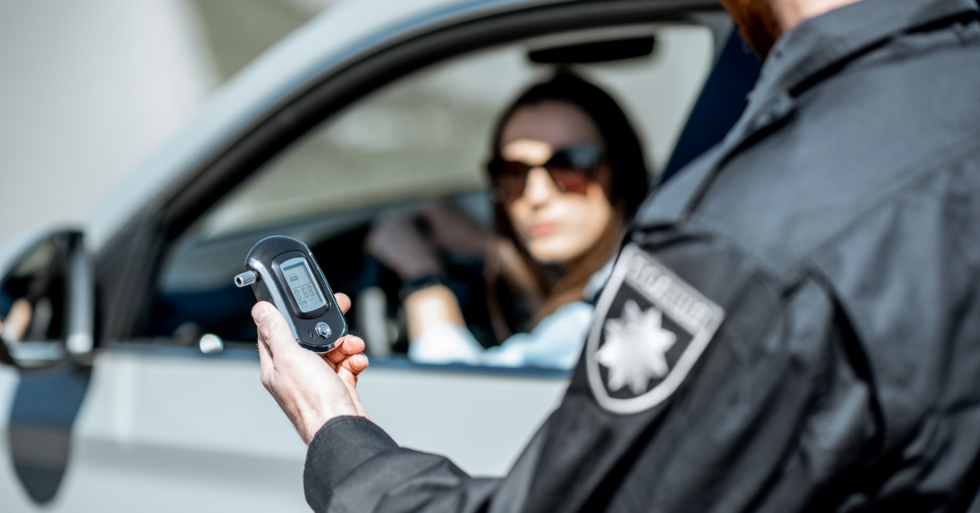Drivers under arrest in Massachusetts for Operating Under the Influence (OUI) will be asked to submit to a chemical test to determine their Blood Alcohol Concentration (BAC). This is an “implied consent” state, meaning that if a driver is arrested for an OUI, they are deemed to have consented to a breathalyzer test.

If the driver refuses to take the test or fails to provide two adequate breath samples, their licenses will be suspended for 180-days to life.
Implied Consent In Massachusetts
Implied consent laws allow law enforcement officers to obtain a blood alcohol test from suspects without a warrant. Implied consent laws allow officers to assume that a driver has consented to a BAC test simply by being licensed to drive in the state.
What Is The Legal Limit In Massachusetts?
If a person is 21 years or older submits to a breathalyzer test and registers a BAC of 0.08% or greater, the RMV will suspend or revoke their learner's permit or driver's license or their right to operate a vehicle for 30 days.
Breathalyzer Test Refusal
If a driver is arrested for OUI and refuses the breathalyzer test in Massachusetts there will be a mandatory license suspension. Penalties for refusing the breathalyzer test range from 180-days for drivers with no prior OUI's to lifetime suspensions.
The Massachusetts Legislature has created strict penalties for breathalyzer refusals to deter people from drinking and driving and obtain evidence against those suspected of driving under the influence. It is important to weigh the loss of the Driver's license against the possibility of beating the criminal case after refusal.
What Is A Car Breathalyzer?
Car breathalyzers, also known as Ignition Interlock Devices (IID), are discreet electronic devices that are wired into a car's ignition. The vehicle will not start if the driver has a certain amount of alcohol on their breath and it is used to prevent drivers from starting their car unless they pass the BAC test.
The Massachusetts Ignition Interlock Law requires anyone with two or more DUI convictions on their record, who is reinstating, getting a hardship license, or getting a full license to use a certified ignition interlock device in each vehicle that they own. The IID must remain in effect during the operator's hardship license period plus two years when they get a 24/7 license.
Issues With Breathalyzer Tests
The reliability of breathalyzer tests has been questioned these past few years. The Office of Alcohol Testing (OAT) recently went through reforms so that breathalyzer test results could be used in court.
Although Prosecutors across the Commonwealth can now try and introduce the breathalyzer test results, there are a number of ways to challenge the breathalyzer validity in court:
- Question the testing procedure
- Analyze the numerical results
- Confirm the validity of the breathalyzer itself
- Observe the handling and storage of the evidence
Draeger Alcotest 9510
A statewide hearing was conducted regarding the Draeger Alcotest 9510 over whether it is reliable scientifically when administering a breath test. As a result of that hearing, all breath tests administered in Massachusetts between June 2011 and April 18, 2019, have been excluded from criminal prosecutions. As a result, people have been able to challenge the disposition of their case because this test was utilized and led to an OUI during that time.
The court has sent notices to those who were affected by inaccurate breathalyzer tests. But in November 2021, Judge Robert Brennan ruled the results from the Draeger Alcotest 9510 breathalyzers can be used as evidence in DUI cases once again.
Can A Case Be Dismissed After A Breathalyzer Test?
Though Massachusetts has strict DUI laws, a case can be dismissed even after a breathalyzer test. For example, if a case is resolved with a Continuance Without a Finding (CWOF) , this case can eventually be dismissed or even sealed. Each case is different and not everyone is eligible for a CWOF, but it is an option to consider for an OUI or DUI case.
What are factors that can be used in defending against OUI / DUI charges?
There are a number of factors that can be utilized as part of a strong legal defense against OUI (Operating Under the Influence) charges. These factors can challenge the validity of the evidence obtained during the traffic stop and subsequent breathalyzer test. Here are some notable defenses that the team at Gilman Law analyzes in every OUI/DUI cases:
- Lack of reasonable suspicion: Did the police officer have a valid reason for the police to initiate the traffic stop in the first place. If the officer lacked reasonable suspicion that a traffic offense or other violation had occurred, any evidence obtained during the stop may be suppressed.
- Violations of traffic stop procedures: If the officer did not adhere to proper traffic stop procedures, such as failing to provide necessary warnings or failing to inform the driver of their rights, this can be used to challenge the legality of the arrest and any evidence obtained thereafter.
- Lack of probable cause: Was insufficient probable cause to make an arrest for OUI? The prosecution must demonstrate that there was a reasonable belief, based on specific facts and circumstances, that the defendant was operating a vehicle on a public way under the influence of alcohol or drugs.
- Unlawful "custodial interrogation": If any statements or admissions were elicited from the defendant during the arrest process without the proper Miranda warnings, these statements may be deemed inadmissible in court.
- Inconsistencies or contradictions in state evidence: are there any inconsistencies, contradictions, or omissions. This can weaken the prosecution's case and cast doubt on the accuracy and reliability of their evidence. Such inconsistencies and contradictions are ripe for cross examination of the police officer during trial
It is important to note that while a failed breathalyzer test can be damaging, it is not an insurmountable obstacle. The team at Gilman Law explores these and other defenses to challenge the breathalyzer test results while also seeking to weaken the overall prosecution's case and challenge its admissibility.
Why are breathalyzers tests preferred over blood and urine tests during OUI / DUI stops?
Breathalyzer tests are the preferred method over blood and urine tests during OUI / DUI investigations due to a few key reasons. Firstly, breathalyzer tests provide objective numerical data that support an officer's assessments in more subjective roadside tests. By adding a quantifiable measure to their observations, officers can strengthen their judgment in determining whether a driver is under the influence.
Additionally, breathalyzer tests are known for their speed and simplicity. Compared to blood and urine tests, which require more time for processing, breathalyzer results can be obtained rapidly. This efficiency is critical during traffic stops, as officers need prompt information to decide whether to take further action and detain potentially intoxicated drivers.


